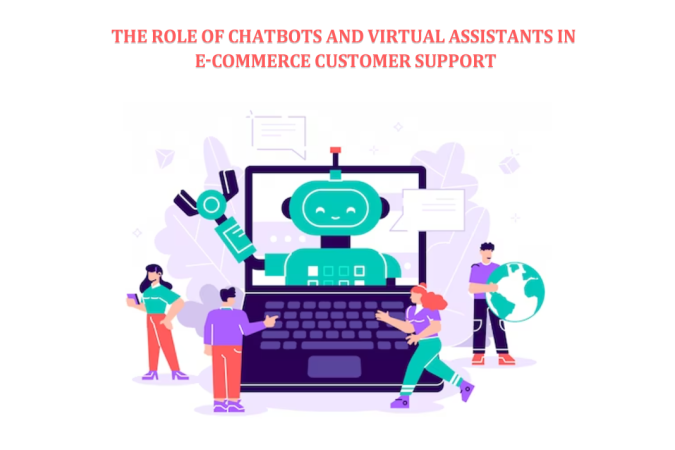
Digimagaz.com – The introduction of AI chatbots has caused a significant revolution in the marketplace, with the eCommerce industry embracing them as an essential customer service component.
Industry giants like Google, Amazon, Medium, and numerous small-scale startups have integrated AI chatbots into their operations to cater to customer support needs.
As a result, eCommerce businesses now actively employ AI-powered customer support to streamline their business operations and enhance the overall shopping experience for their customers.
Let’s discuss the role of chatbots and virtual assistants in e-commerce customer support and their primary advantages.
Top 5 Advantages of Chatbots and Virtual Assistants
- 24/7 availability
Customers expect instant and seamless access to services anytime in today’s interconnected world. 24/7 availability ensures businesses can offer continuous support and assistance around the clock, every day. This is made possible through AI-powered chatbots and virtual assistants, which handle routine queries and provide instant solutions without human intervention. Customers receive immediate attention and support regardless of the time zone, enhancing their overall satisfaction.
-
Personalization
Personalization in customer support involves tailoring interactions to meet individual needs and preferences. AI chatbots excel in this area by analyzing customer data, such as purchase history and buying behavior, to offer personalized product recommendations through WooCommerce request a quote plugin and relevant support. This creates a more engaging experience, making customers feel valued and leading to increased cross-selling opportunities.
-
Self-service support
Self-service support empowers customers to find answers independently, reducing the load on customer service teams. AI chatbots provide self-help tools like FAQs, WooCommerce loop description, and troubleshooting guides, ensuring customers can resolve issues independently. This convenience improves efficiency and customer experience.
-
Multilingual support
Multilingual support accommodates international customers by offering service in their preferred language. AI-powered chatbots with natural language processing capabilities can seamlessly communicate in various languages, fostering inclusivity and broadening the customer base.
-
Reduced response time
Reduced response time is crucial in today’s fast-paced world. AI chatbots process and analyze customer inquiries instantly, providing prompt solutions. By handling routine tasks, chatbots free up human agents to focus on complex issues, resulting in faster resolutions and happier customers. Reduced response times foster customer loyalty and help businesses stay competitive, emphasizing the importance of excellent customer service in the e-commerce industry.
Future of Chatbots and Virtual Assistants in eCommerce
The future of chatbots and virtual assistants in eCommerce looks incredibly promising, with ongoing advancements in technology geared towards enhancing customer experiences. Let’s delve into some key areas that will shape this future landscape:
-
Natural Language Processing (NLP)
The continuous development of Enhanced Natural Language Processing (NLP) will revolutionize how chatbots and virtual assistants interact with users. Refining AI algorithms will better understand and respond to human language, making conversations feel more natural and intuitive. This improved NLP will enable chatbots to decipher complex queries, understand context, and accurately interpret user intent, even when phrased differently or ambiguously.
Furthermore, future chatbots will exhibit emotional intelligence, detecting emotions and sentiments expressed by users. This means chatbots can respond empathetically, adapting their tone and responses accordingly. As a result, interactions will become more engaging and emotionally meaningful, fostering stronger connections between customers and the brand.
-
Augmented Reality (AR) and Virtual Reality (VR)
Integrating chatbots and virtual assistants with Augmented Reality (AR) and Virtual Reality (VR) technologies will elevate the online shopping experience. Customers will enjoy immersive and interactive shopping journeys from their homes.
Imagine being guided by a virtual assistant through a virtual store, where you can explore products in a three-dimensional space. Visualizing furniture, home decor, or clothing items in your living space using AR will boost confidence in purchasing decisions, leading to fewer returns and increased customer satisfaction.
-
Emotional Intelligence
In the future, chatbots will possess emotional intelligence, discerning human emotions through language patterns, tone of voice, and facial expressions. This heightened emotional awareness will enable chatbots to respond empathetically and appropriately to customers’ feelings, showing understanding, patience, and reassurance.
Emotionally intelligent chatbots will foster a stronger connection and trust between customers and businesses. Customers are likelier to engage and remain loyal to a brand that understands and empathizes with their emotions.
-
Collaborative Human-AI Support
Collaborative Human-AI Support will reshape customer service in eCommerce. Chatbots will work alongside human support agents, complementing their efforts rather than replacing them. AI-powered chatbots will handle routine tasks efficiently and at scale, while human agents focus on addressing complex and personalized issues.
The integration will be seamless, with chatbots transferring context and data to human agents when necessary. This streamlined collaboration will result in quicker and more accurate resolutions, providing a more comprehensive and satisfying customer support experience.
-
Improved Security and Privacy Measures
With chatbots and virtual assistants managing sensitive customer data, robust security and privacy measures are paramount. The future will see businesses prioritize enhancing security protocols to protect customer information from data breaches and cyber threats.
Encryption techniques will be adopted to ensure secure data transmission, while multi-factor authentication will safeguard user access. Adherence to the industry’s best data storage and handling practices will be central to maintaining customer trust.
AI systems will also be designed to respect user privacy and compliance with data protection regulations. Customers will have greater control over their data, enabling them to access, modify, and delete information as needed.
Conclusion
Chatbots and AI virtual assistants have become indispensable tools for delivering efficient and cost-effective customer service in the modern business landscape. These AI-powered solutions work tirelessly, providing customers with quick and personalized answers to their queries and enhancing their overall experience.
Chatbots and virtual assistants have revolutionized e-commerce customer support, providing round-the-clock availability, personalized assistance, and quick solutions. Their integration offers cost-effective and efficient support, enhancing customer experience and streamlining business operations.





